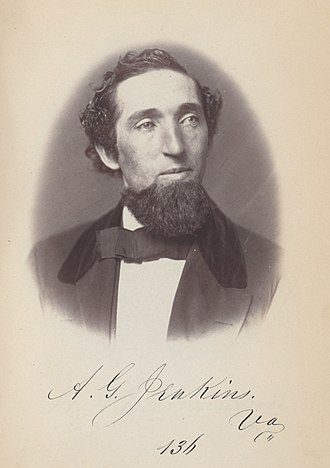A CONFEDERATE GENERAL’S CHILDREN SUED FOR CONFISCATED PROPERTY.|
[General Albert G. Jenkins, Confederate Army, owned property in Ironton, Ohio. See below]
 August 11, 1882, p8 Cincinnati Enquirer
August 11, 1882, p8 Cincinnati EnquirerYesterday Alberta G., Maggie V., and James Jenkins, children of the late General Albert G. Jenkins of the Confederate Army, filed in the Circuit Court of the United States in this city a petition against Wm. F. Hannan and Jeremiah Davidson of Ironton, Ohio, and the Second National Bank of Ironton, Ohio, alleging in substance that on May 17, 1862, and for a long time prior thereto, Albert G. Jenkins was the owner of a lot in Ironton, Ohio, covered by two three-story brick houses.
During the months of July and August 1861, five separate suits were instituted against him in the Court of Common Pleas of Lawrence County, Ohio, which suits were instituted by attachment, based on the non-residence of Albert G. Jenkins in the State of Ohio and his residence in Virginia, and levied upon said property.
An order of publication was issued in each suit, directed to Jenkins, stating the fact of the institution of the suits and the nature of the claims, and notifying him to appear and answered, or the claims would be taken as confessed; that the orders and notices were each published in a newspaper published, printed and circulated in Lawrence County, and a personal judgment was afterward obtained in each case against Jenkins, and in order of sale of the attached property issued by the Court.
On May 17, 1862, the property was sold under an order for sale by the Sheriff of Lawrence County to F. Hannan. On October 23, 1866, Hannan conveyed it to the Second National Bank of Ironton, Ohio, for $12,500. On September 25, 1866 (?), the bank conveyed one-half to Jeremiah Davidson, and the bank and Jeremiah Davidson are now in possession, claiming ownership by former proceedings and deeds.
On May 29, 1861, Albert G. Jenkins entered the military service of the Confederate States of America, and during the year 1861 and for a long time prior thereto, he was a resident of the State of Virginia. He died May 21, 1864, at the time holding the rank of Major-General in the service, and had been continuously engaged in the same since May 29, 1861, in armed hostility against the Government of the United States – and had never been in the State of Ohio since the 29th day of May 1861, all of which was well known to the defendants.
At the time of the publication of the notices, Albert G. Jenkins was living within the district covered by the proclamation of the President of the United States and was prohibited by said proclamation from holding any intercourse with parties living in the County of Lawrence, and, as an enemy of the United States Government, and living within the said district. He could not see and obey the summons, defend the suits, and die ignorant of their existence.
Because of the premises, the plaintiffs claim the proceedings, judgments, and deeds are all inoperative and voice and that the defendants have no right or title to the property against the plaintiffs, who pray that judgments, executions, and attempted sales and proceedings thereunder may be declared null and void, and that an account may be taken of the rents and profits of said premises, and that plaintiffs may be at liberty to redeem said property on payment to defendant Hannan the amount paid by him at said sale, less the rents and profits.
Robert W. Goode and M. W. Huff of St. Louis, and Franklin T. Cahill of Cincinnati filed the suit.

0 Comments